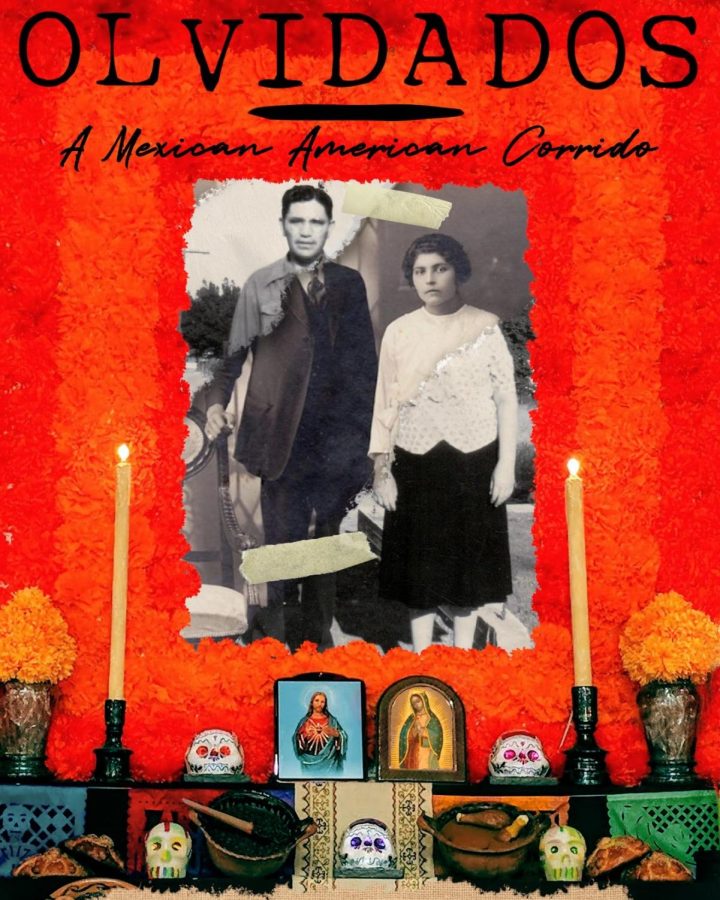“Olvidados: A Mexican American Corrido,” a play written and performed by University of Massachusetts professor Elisa Gonzales in partnership with the Latina Breath of Fire Theater Ensemble, left audiences moved and inspired. This workshopped production, which took place from April 7-9, exposed the intergenerational effect of Mexican repatriation, specifically its effect on the women in Gonzales’ family. “Olvidados,” which was originally written to be a one-woman show, featured Gonzales and two supporting actresses, Jordan McNair and Victoria Tavares. The play was inspired by the traditional structure of Mexican corrido, which is a musically driven theater style that draws upon folklore and storytelling. Musical breaks were arranged and composed by Moises Vazquez.
Through “Olvidados”, Gonzales conveyed the plight and courage of Mexican American women, who often raised their families independently from their working husbands. Themes of immigration were also discussed, helping to convey the duality of Mexican and American identity. The performance illustrated struggles Mexican Americans faced as they were unfairly blamed for America’s collapsing economy during the Great Depression. Mexican immigrants were unconstitutionally coerced to leave the United States and return to Mexico. As a result, many Mexican Americans were forced to choose between staying in a hostile, racist environment in the U.S. or going back to their Mexican hometowns, which were often impoverished and provided poor living conditions. ”Olvidados” specifically focused on the intense emotional and physical turmoil Gonzales’s great grandmother experienced as she chose to move back to Mexico with her children while her husband stayed in the U.S. Despite being an American citizen, Gonzales’ grandmother was raised in Mexico, left grappling with her sense of identity and perpetually doubting the validity of her Mexican heritage.
The writing and organization of the performance was thoughtful, and while the play was informative, it was also entertaining and emotionally touching. All the actresses maintained a consistent level of charisma, even when faced with the challenge of playing multiple roles. Truly developing the character for each role they took on, there were clear variations in body language, mannerisms and voice. Gonzales played three different characters, each at various points in their lives. She effortlessly spoke in a higher, more lively pitch to play her grandmother at the age of eight. These subtle changes revealed crucial insight into each character’s thought processes and perspective. Playing the role of her eight-year-old grandmother, Gonzales purposely stumbled over the word “repatriation” to show her grandmother’s lack of familiarity with the concept. The dedication and talent of each performer shone through, keeping the performance exceptionally engaging.
The design elements and costuming of ”Olvidados” were also enchanting, especially the set design and lighting. The set was painted bright blue, with warm candles illuminating the stage. Midway through the performance, the actresses opened the shutters of a window, unveiling a glowing portrait of Lady Guadalupe. At the beginning of the play, small points of cool, white light flickered across the theater like stars.. All of these elements added a spiritual tone to the performance and made the connection between the performers and the audience feel more intimate. The costume choices were also elegant but practical, serving as clear indicators of which character was being played. There was a level of consistency to them, a simple pastel dress with low heels, but this simplicity increased the versatility of the costumes. There was no need for drastic or elaborate costume changes, Gonzales swiftly added accessories onstage to indicate a shift in roles. Like the strength of acting, the attention to detail illustrated the lives of Gonzales’ family and the poverty they faced.
One of the most notable aspects of the performance was the work of the talented musical ensemble, which consisted of singer Ayleena Lyles and musicians Lucas Solorzano and Julissa Rodriguez. The musical breaks revealed significant plot points, illustrating the characters’ struggles through a different artistic form. The vocalists complemented each other nicely, and there was great variation in tone of each musical break; some were lively, while others were somber and emotional. Regardless, these breaks allowed for an opportunity to more tangibly understand the characters’ hardships and inner thoughts.
Overall, “Olvidadados: A Mexican American Corrido” was captivating and entertaining, while historically insightful. The audience was stimulated by different artistic methods, whether it was song, dance or acting. The untold stories of millions of Mexican immigrants were acknowledged through this performance, and the connection between the audience and Gonzales felt warm and personal.
Laleh Panahi can reached at [email protected].




















